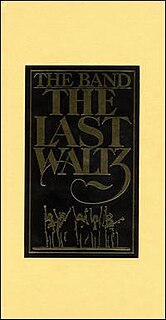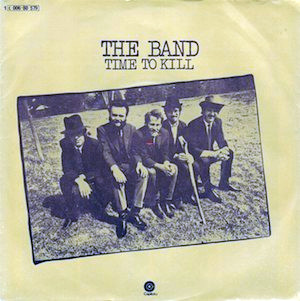Related Research Articles

The Band was a Canadian-American rock band formed in Toronto, Ontario, in 1967. It consisted of four Canadians and one American: Rick Danko, Garth Hudson, Richard Manuel, Robbie Robertson, and Levon Helm. The Band combined elements of Americana, folk, rock, jazz, country, and R&B, influencing subsequent musicians such as the Eagles, Elton John, the Grateful Dead, the Flaming Lips, and Wilco.

Stage Fright is the third studio album by Canadian–American group the Band, released in 1970. It featured two of the group's best known songs, "The Shape I'm In" and "Stage Fright", both of which showcased inspired lead vocal performances and became staples in the group's live shows.

Rock of Ages: The Band in Concert is a live album by The Band, released in 1972. It was compiled from recordings made during their series of shows at the Academy of Music in New York City, from December 28 through December 31, 1971. It peaked at No. 6 on the Billboard 200 chart, and was certified a gold record by the RIAA. An expanded release of recordings taken from the same series of shows, called Live at the Academy of Music 1971, was released in 2013.

Jubilation is the tenth and final studio album by Canadian/American rock group the Band. Recorded in the spring of 1998 in Levon Helm's home studio in Woodstock, New York, it was released on September 15, 1998. For the first time since the group reformed without guitarist and songwriter Robbie Robertson, there were more originals than covers. Songs include "Last Train to Memphis", featuring guest guitarist Eric Clapton, Garth Hudson's solo instrumental closer "French Girls", Rick Danko's "High Cotton" and the ode to Ronnie Hawkins, "White Cadillac".

The box set The Last Waltz is a 2002 four-disc re-release of the 1978 album The Last Waltz documenting the concert The Last Waltz, the last concert by the Band with its classic line up. A full forty tracks are taken from the show in addition to rehearsal outtakes. Twenty-four tracks are previously unreleased.

Across the Great Divide is a box set by Canadian-American rock group the Band. Released in 1994, it consists of two discs of songs from the Band's first seven albums, and a third disc of rarities taken from various studio sessions and live performances. The set is now out of print, having been replaced by the five-CD/one-DVD box set A Musical History that was released in September 2005.
"Acadian Driftwood" is a song by The Band. It was the fourth track on their sixth studio album Northern Lights – Southern Cross (1975), written by member Robbie Robertson. Richard Manuel, Levon Helm and Rick Danko trade off lead vocals and harmonize on the chorus.
"Chest Fever" is a song recorded by the Band on its 1968 debut, Music from Big Pink. It is, according to Peter Viney, a historian of the group, "the Big Pink track that has appeared on most subsequent live albums and compilations", second only to "The Weight". The music for the piece was written by guitarist Robbie Robertson. Total authorship is typically credited solely to Robertson, although the lyrics, according to Levon Helm, were originally improvised by Levon Helm and Richard Manuel, telling the story of a man who becomes sick when he is spurned by the woman he loves.

"Stage Fright" is the title track of the Band's third album, Stage Fright. It features Rick Danko on lead vocals and was written by Robbie Robertson. According to author Barney Hoskyns, Robertson originally intended it to be sung by Richard Manuel but it became clear that the song was better suited to Danko's "nervous, tremulous voice."
"It Makes No Difference" is a song written by Robbie Robertson and sung by Rick Danko that was first released by The Band on their 1975 album Northern Lights – Southern Cross. It has also appeared on live and compilation albums, including the soundtrack to the film The Last Waltz. Among the artists that have covered the song are Solomon Burke, My Morning Jacket and Over the Rhine.

"The Shape I'm In" is a song by The Band, first released on their 1970 album Stage Fright. It was written by Robbie Robertson, who did little to disguise the fact that the song's sense of dread and dissolution was about Richard Manuel, the song's principal singer. It became a regular feature in their concert repertoire, appearing on their live albums Rock of Ages, Before the Flood, and The Last Waltz. Author Neil Minturn described the song as "straightforward rock." Along with "The Weight," it is one of the Band's songs most performed by other artists. It has been recorded or performed by Bo Diddley, The Good Brothers, The Mekons, The Pointer Sisters, She & Him, Marty Stuart and Nathaniel Rateliff and the Night Sweats.

"Rag Mama Rag" is a song by The Band which was first released on their 1969 album The Band. It was also released as a single, reaching #16 in the UK, the highest of any single by the group. The single was less successful in the US, reaching only #57 on the Billboard Hot 100.
"Sleeping" is a song by The Band, first released on their 1970 album Stage Fright. It was also released as the B-side to the "Stage Fright" single. It was co-written by Robbie Robertson and Richard Manuel. This and “Just Another Whistle Stop” are the only two songs Manuel receives credit for on the album. Music critic Barney Hoskyns rates it as "one of Richard [Manuel's] liveliest performances" and "one of The Band's most intricate arrangements." The Band never featured the song on a live album.
"Daniel and the Sacred Harp" is a song written by Robbie Robertson that was first released by The Band on their 1970 album Stage Fright. It has been covered by such artists as Barrence Whitfield.
"When You Awake" is a song written by Robbie Robertson and Richard Manuel that was first released on The Band's 1969 self-titled album The Band. A live performance was included on the Bob Dylan and The Band live album Before the Flood.

"Ophelia" is a song written by Robbie Robertson that was first released by The Band on their 1975 album Northern Lights – Southern Cross. It was the lead single from the album. It has also appeared on several of the group's live and compilation albums, and has been covered by such artists as Vince Gill and My Morning Jacket.

"Time to Kill" is a song written by Robbie Robertson that was first released by the Band on their 1970 album Stage Fright. It was also released as a single off the album, backed with the more famous "The Shape I'm In" and, although it failed to reach the Top 40 in the United States, it peaked at #13 in the Netherlands. It has also been featured on several Band compilation and live albums.
"Jemima Surrender" is a song written by Levon Helm and Robbie Robertson. It was first released on the Band's self-titled album in 1969. Usual Band drummer Levon Helm played guitar and sang the lead vocal while usual Band pianist Richard Manuel played drums. The song's lasciviousness helped inspire Naomi Weisstein to form the Chicago Women's Liberation Rock Band.
"The Unfaithful Servant" or "Unfaithful Servant" is a song written by Robbie Robertson that was first released by The Band on their 1969 album The Band. It was also released as the B-side of the group's "Rag Mama Rag" single. It has also appeared on several of the Band's live and compilation albums.
"4% Pantomime" is a song written by Robbie Robertson and Van Morrison. It was first released on the Band's 1971 album Cahoots.
References
- 1 2 3 4 5 6 7 8 9 10 11 12 13 14 Hoskyns, Barney (2006). Across the Great Divide. Hal Leonard. pp. 26, 241, 265, 267, 284, 331. ISBN 9781423414421.
- 1 2 3 4 5 6 7 Harris, Craig (2014). The Band: Pioneers of Americana Music. Rowman & Littlefield. pp. 136, 139–140, 148, 150, 174–175. ISBN 9780810889040.
- 1 2 3 Aaron, Peter (2016). The Band FAQ. Backbeat Books. pp. 22, 92–93, 234. ISBN 9781617136139.
- 1 2 3 4 Burks, John (September 17, 1970). "Stage Fright". Rolling Stone . Retrieved 2017-04-29.
- ↑ Schneider, J. (2009). Whispering Pines: The Northern Roots of American Music... from Hank Snow to the Band. ECW Press. ISBN 9781554905522.
- ↑ Ruhlmann, William. "Stage Fright". Allmusic . Retrieved 2017-04-29.
- 1 2 3 4 5 DeRiso, Nick. "The Band, "W.S. Walcott Medicine Show" from Stage Fright ( (1970): Across the Great Divide". Something Else!. Retrieved 2017-04-29.
- 1 2 3 "Stage Fright". The Band. Retrieved 2017-04-29.
- ↑ Mintum, Neil (2005). The Last Waltz of the Band. Pendragon Press. p. 144. ISBN 9781576470930.
- ↑ Rucker, Leland (1999). Graff, Gary; Durchholz, Daniel (eds.). MusicHound Rock: The Essential Album Guide. Schirmer Trade Books. p. 72. ISBN 0825672562.
- ↑ Blake, David K. (2015). Moskowitz, David V. (ed.). The 100 Greatest Bands of All Time: A Guide to the Legends Who Rocked the World. ABC-CLIO. p. 37. ISBN 9781440803406.
- ↑ Erlewine, Stephen Thomas. "To Kingdom Come". Allmusic . Retrieved 2017-04-29.
- ↑ Ruhlmann, William. "Across the Great Divide". Allmusic . Retrieved 2017-04-29.
- ↑ Erlewine, Stephen Thomas. "A Musical History". Allmusic . Retrieved 2017-04-29.
- 1 2 "Special Merit Picks". Billboard Magazine. September 9, 1972. p. 49. Retrieved 2017-04-30.
- 1 2 3 Gleason, Ralph J. (October 12, 1972). "Rock of Ages". Rolling Stone . Retrieved 2017-04-29.
- ↑ Barsocchini, Peter J. (October 28, 1972). "Rock of Ages: Musical Memoir of Year's Eclipse". San Mateo County Times . Retrieved 2017-04-30– via newspapers.com.
- ↑ "Palladium Circles: The Classic NYC Broadcast 1976". Allmusic . Retrieved 2017-04-29.
- ↑ Deming, Mark. "The Last Waltz". Allmusic . Retrieved 2017-04-29.
- ↑ Erlewine, Stephen Thomas. "The Last Waltz [Box Set]". Allmusic . Retrieved 2017-04-29.